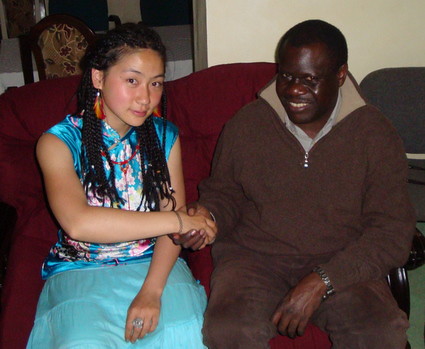“Do you want to meet the Kenyan Ambassador to China tomorrow?” Said Kakenya Ntaiya, on our bumpy country road from Enoosaen-her remote village in the south of Kenya-to Kilgoris, a town with just-a-little-bigger-size, 20 kilometers away from Enoosaen.
“Ahahaha…” I looked at her face–all as usual-“Good joke.”
“Here is a message for you.” She handed her cell phone to me.
“‘Ming Tian Jian-Tell the Chinese to read it.'” I read the message loudly with shock, “It is Chinese saying of ‘See you tomorrow’! Who is this?”
“I told you, the Kenyan ambassador to China.” Kakenya smiled.
5:00 p.m. on the next day’s afternoon, I was therefore drinking the Kenyan milk tea contained in the Chinese-china with Kakenya in the ambassador’s house located on the hill in Gilgoris.

AP Fellow Luna Liu, dressing in Chinese traditional cheongsam-top, shaked hands with the present Kenyan Ambassador to China Julius Sunkuli at his home in Kilgoris, Kenya.
Ambassador Julius Sunkuli appeared in front of us with casual outfit and warmly hugged Kakenya. He then politely asked me not to mind him dressing comfortably to meet us as his friends–especially after his meeting with all different kinds of politicians from morning to evening. After greeting him in Maasai and Chinese mandarin, I started my conversation with the standard diplomatic question.
Luna Liu: Compared with the international relationship between Kenya and the U.S., how do you think about the relations between Kenya and China?
Julius Sunkuli : You know the relationship between the US and Kenya is a long relationship of good friendship. Kenya, during the cold war, was on the side of the U.S. .After the cold war, Kenya still remained a very strong relationship with the U.S. and U.S. is still considered to be a friendly country to Kenya. The relationship between Kenya and China, although was not really good during the cold war, in the comparative terms, it is better than the relationship between Kenya and the United States now. Because you know the U.S and many western countries, they adopted a system where they wanted to impose their ways of life to Kenya, and Kenya has resisted to it a lot because the idea that the American type of democracy must work everywhere in the world is considered to be offensive to many Kenyans. Worst of all, when Kenya is going through the financial hardship, the Americans attach politics to aid. They give you conditions for aid, and when you fulfill these conditions, they give you new words. There is always a new condition that you do not get aid. The Chinese policy is a win-win situation. They open up for trade, and today we can see within a short time, Kenya has erected the infrastructure. The roads in Kenya have been really built up during the last three years; this is mainly done by Chinese companies. We believe that we will get a good solution of our poverty from China, because we want to buy the cheap machinery, that is affordable, that is manufactured in China. We also want to accept the fact that Chinese are giving us good technology while Americans would rather sell us commodities. The (construction of) roads bring technology here with us. So the relationship of Kenya and China is growing a lot.
Most of the roads in Kenya now have been done by Chinese, for example, most important roads in Nairobi and Mombasa, the road from Nakuru to Eldoret and many other roads are bridged by Chinese… The Chinese are bidding for important projects, Mombasa port, Lamu port and railways from Mombasa to Kampala and to Central Africa and most likely Chinese can win them. So Chinese companies have a very huge influence in Kenyan road construction.
Luna Liu: Chinese construction companies in African region have been criticized by western media for not hiring local labors in their projects and therefore local people did not benefit from the employment created by these development activities. How would you like to address this opinion?
Julius Sunkuli : Most Chinese companies hire local people in Kenya; so I do not think that is a big problem here in Kenya. What matters for us is the quality of the road. We are the ones who benefit from the road; it will be the road for Kenyan people.
Luna Liu: How does the Chinese speedy economic development impact the economy in Kenya?
Julius Sunkuli : There is a little thing could be done, which is Chinese buy more commodities from Kenya, like tea, leather, coffee, flowers then we can try to balance the trade. But I think the trade between China and Kenya is going to grow.*
*For Ambassador Julius Sunkuli’s opinion about girls’ education in Kenya and his promise about supporting Kakenya Ntaiya’s dream-the Maasai girl school of Kakenya Center for Excellence, please see the incoming post- Meeting the Kenyan Ambassador to China Part 2 Maasai Girls’ Education.
* The interview notes were collected and proofread by AP Fellow Luna Liu on 8th, Aug 2009)
“明天你想不想见肯尼亚驻中国大使?”Kakenya Ntaiya,我在肯尼亚实习的老板,在上颠下跳的肯尼亚南部的乡村土路上就这样突然地问起来 。
“啊哈哈……干吗不?”我调侃地回答了她。
“看短信罢那就。”她递给我她的手机。
“Ming Tian Jian(明天见)—让中国人看这条短信。”我的嘴巴成了O字形,“这是中文呃!?谁?”
“跟你说了你不信,肯尼亚驻中国大使呗。”我的老板大笑起来。
如此于是。第二天的下午5:00,我恍然地坐在现任肯尼亚驻中国大使在Kilgoris乡村的家中庭院里,用中国的瓷杯喝着肯尼亚奶茶。
大使Julius Sunkuli (以下简称Julius)一身便装出现了。在热情拥抱了我的老板以后,大使很客气地说: “你好吗?(以后为英文)自从回到这边以后,每天从早到晚都一身正装会见各种政治家,Kakenya是我的朋友,你是她的朋友,见面朋友,我还是想穿得舒服点。请见谅。”
尽管大使大约再也不想打官腔,难得与大使面对面,我于是还是以典型的外交问题开始了我们的对话。
Luna:相比起美国与肯尼亚之间的关系,你是怎么看待中肯关系的?
Ambassador Julius: 你大概知道美肯之间长久维持着良好的合作关系。肯尼亚在冷战时期,是支持美国的。在冷战之后,肯尼亚仍然与美国往来密切并且美国仍被认为是对肯尼亚的比较友好的国家之一。中肯关系,尽管在冷战时期比较僵硬,但现在来看,可以说是比美肯关系更为亲密。美国和一些西方国家,一直采取一种强硬的态度向世界上不同国家的人民推崇西方的生活方式和政治体制,这在肯尼亚是被认为有所冒犯的并难以被肯尼亚人民所接受的。尤其是,当肯尼亚在度过经济难关的时候,来自美国的国际援助总是被附带上政治条件。当肯尼亚履行完一个附带条件,美国的政治家会继续附加新的条件—总是有新的政治条款让肯尼亚人民难于获得援助。
相比之下,中国对肯尼亚的外交政策是一种双赢政策。中国对肯尼亚开放贸易,并且帮助肯尼亚进行基础建设。在过去的三年中,我们可以看到很多肯尼亚的公路是由中国公司建设起来的。我们相信,从中国我们可以学到解决贫困的方法,因为我们希望买到我们能力得以支付的中国制造的机器设备。我们也愿意接受一个现实,就是中国在通过建设道路帮助肯尼亚获得科技技术,而美国更愿意卖给我们商品。中肯关系在日益发展。
说起公路建设,在内罗毕和蒙巴萨最重要的公路,从Nakuru到Eldoret的公路,以及很多其它重要的公路都是由中国建设公司完成的。中国公司现在还在竞标一些其它的重要建筑工程比如蒙巴萨和拉木的港口,以及从蒙巴萨到卡帕拉(乌干达的首都)以及到中非的铁路。目前来说,中国公司很有希望标下这些项目。中国在肯尼亚的基础建设方面,因此是很有影响的。
Luna: 据我在美国的生活经验,西方媒体经常批评在非洲的中国建筑公司不雇佣当地劳工,因而中国在非洲的发展工程并没有为当地人民创造就业及收入机会并使之受益。对于这种意见,您是怎么看待的?
Ambassador Julius: 就我所知,大部分中国驻肯尼亚的建筑公司是基本雇佣当地劳工的,所以我不认为这在肯尼亚是一个很大的问题。我们看重公路的质量,因为这些公路将会是肯尼亚人民的,从其受惠的也将是肯尼亚人民。
Luna:中国的经济快速发展是如何影响肯尼亚的经济的?
Ambassador Julius: 我认为中国如果加大与肯尼亚的贸易,更多进口我们的茶叶,皮革,咖啡和鲜花,会有助于平衡我们的贸易逆差。但是无论如何,中肯之间的贸易一定会继续增长的。
本文是由AP志愿者刘路在2009年8月8日经整理采访录音笔记并校对翻译后所发表的
Posted By Luna Liu
Posted Aug 10th, 2009

